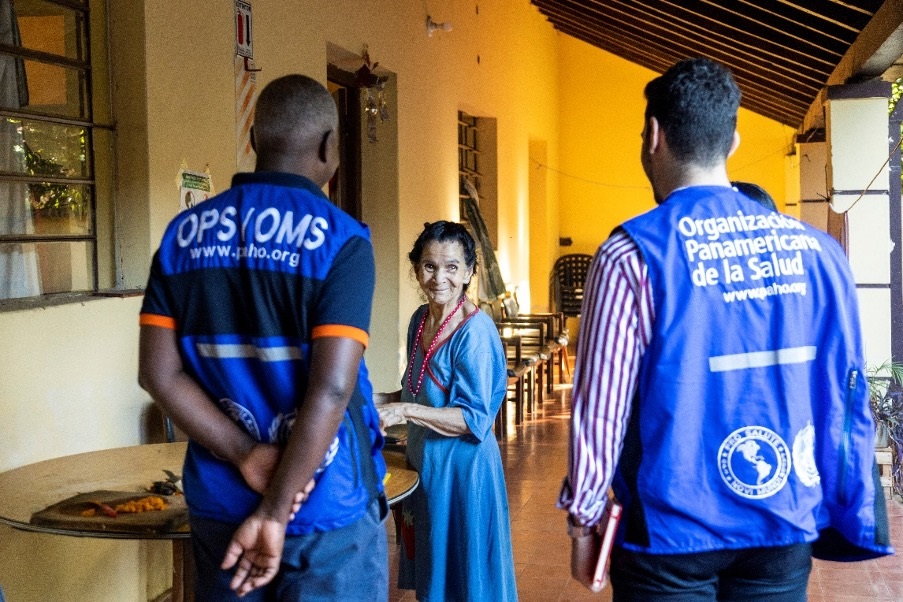/data-and-analytics-(dna)/data-exchange-(dex)/who-presence-in-countries--territories-and-areas.tmb-1920v.jpg?sfvrsn=f1146a2_2)
Advancing deinstitutionalization and community-based mental health care in Paraguay
Stronger WHO country presence for a healthier and safer world
Joint Outcome 4.1.
Equity in access to quality services improved for noncommunicable diseases, mental health conditions and communicable diseases, while addressing antimicrobial resistance
In 2019, the World Health Organization (WHO) launched the WHO Special Initiative for Mental Health in nine countries across its six regions to promote policies and plans with a human rights approach and expand quality interventions and services for mental health, substance use and neurological disorders. Paraguay was selected due to the nation's commitment to change systems, from a recognition of past challenges, to achieve mental health reform, improve access to quality services after the COVID pandemic, and uphold and ensure respect for human rights for institutionalized patients.
Past challenges included legal proceedings at the Inter-American Commission on Human Rights, and systemic issues such as fragmented mental health care, limited funding and overreliance on institutionalized care. The Pan American Health Organization (PAHO)/WHO’s technical cooperation has played a critical role in Paraguay accelerating mental health reform, strengthening community-based care and advancing deinstitutionalization efforts.
Strengthening national leadership
To address system challenges, Paraguay made the political decision to implement mental health reform, emphasizing community mental health and deinstitutionalization. PAHO/WHO, through the Special Initiative for Mental Health, have been pivotal for the country in accelerating this agenda.
The country’s primary public psychiatric hospital, located in the capital city of Asunción, has historically been the main provider of mental health services, housing 194 patients. Deinstitutionalization efforts have gained momentum in the last two years, with many patients reintegrated into community settings or smaller specialized facilities, such as assisted living centres for older adults. WHO has provided technical cooperation in designing and implementing these service reforms, ensuring alignment with international best practices.

Visit to the Sagrada Familia Substitute Home -Luque.
Key transformations include:
Facility improvements: New long-stay admissions have been prohibited, short-stay wards have been remodelled, care practices have been made less restrictive, emergency ward stays have been shortened, and outpatient referral has improved for continuation of treatment at mental health services closer to patients’ communities.
Stakeholder engagement: A key factor in Paraguay’s deinstitutionalization and mental health services reform has been the broad engagement of stakeholders, led by the National Directorate for Mental Health and including the National Institute of Health, the Institute of Social Security, scientific and civil society, and intergovernmental and nongovernmental organizations. These collaborations have supported policy development and expanded community-based services, improving mental health coverage.
Patient reintegration: Long-stay wards have been reduced, with 73 people successfully reintegrated into the community.
Service expansion: The government has invested in new mental health professionals across the country, facilitating access to timely treatments and diagnoses in patients’ own communities. Also, since 2022 Paraguay has officially adopted the Mental Health Gap Action Programme (mhGAP) to be implemented nationwide. Between 2022 and 2024, 122 mental health professionals have been trained as facilitators of the mhGAP intervention guide and distributed in 17 of the country's 18 health regions. In the last three years, more than 316 primary health care workers have been trained to identify people with mental health conditions and offer initial care, with the possibility of referring to specialized nearby services. Plans are underway to develop Paraguay’s first community-based mental health centre and additional halfway homes for individuals with severe mental health conditions. This service will cover about 145 683 places.
Despite progress, significant challenges remain. Although mental health services are now available in almost all regions of the country, access remains limited and the quality of services must be improved, particularly within the public health system. Expanding mental health services at both primary and secondary care levels, using a community-based approach, is essential.
Since 2022, Paraguay has developed key legal and normative frameworks to sustain mental health reforms. These include the National Mental Health Law in 2022, the National Mental Health Policy and Plan 2024–2030, the National Drug Response Plan, and a series of documents to support clinical practice and the organization of specialized services within the public network of services. The mhGAP is being implemented at the primary health care level, with over 316 primary health care workers trained over the past three years in early identification and care for people with mental health conditions, ensuring timely referrals to specialized services.
The solid alliance and strong collaboration between PAHO/WHO and the Ministry of Public Health and Social Welfare have led to significant progress in strengthening mental health governance, restructuring and managing mental health and addiction services, and advancing deinstitutionalization and community-based care. Through the implementation of the Special Mental Health Initiative, Paraguay is integrating mental health into primary care and expanding alternative care options within the framework of the Comprehensive and Integrated Health Services Networks. PAHO/WHO will continue providing technical cooperation to Paraguay in strengthening mental health policies, promoting human rights and expanding community-based services to ensure long-term improvements in mental health care access and quality.
